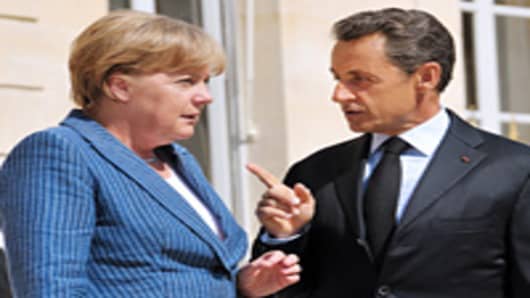Last week a leading analyst about to go onto CNBC’s set in London asked me what was the most important meeting for the euro zone debt crisis. He answered his own question, and that answer summed up what has been a big year for meetings: “the next one”.
During a meeting on Monday I was asked how many EU summits had been held this year and had no idea. The results of an investigation by the people that CNBC sends to cover meeting after meeting surprised me.
The European council of heads of states have met 7 times this year and still have another meeting in the diary. Europe’s finance ministers have met 11 times and plan two more before the year is out.
Throw in the G8 and Wednesday’s G20 summit in Cannes and three meetings of G8/G20 finance ministers and we are on course for 26 meetings. That number of course does not include bilateral meetings and events like the World Economic Forum, where politicians and business leaders gather to discuss social responsibility and party in the Alps each year.
In a bid to understand if summit after summit is a worthwhile use of a policy makers' time, I picked a meeting at random and looked at the communiqué that followed. My meeting of choice was the March 11 meeting of EU heads of state which made clear in its opening sentence that one business is booming: the business of summits.
“The Pact for the euro which establishes stronger economic policy coordination for competitiveness and convergence has been endorsed. This Pact will be presented to the European Council of 24/25 March 2011 with a view for non-euro area Member States to indicate whether they intend to participate in the Pact,” it read.
So EU leaders agreed to a deal which just two weeks later required them to fly back to Brussels to endorse. But what had they agreed upon and what does it tell us about attempts to end the euro zone debt crisis?
“Greece to rigorously continue structural reforms, increase capacity building for their implementation, fully and speedily complete the 50 billion euro privatization and real estate development program it has announced and to introduce a strict and stable fiscal framework with the strongest possible legal basis to be decided by the Greek government,” the statement said.
Sounds promising but what about a "big bazooka," as the market parlance goes these days, to protect other bond markets guys?
“The ESM will have an overall effective lending capacity of 500 billion euros. During the transition from EFSF (European Financial Stability Facility — the euro zone's bailout fund, essentially ) to ESM (European Stability Mechanism — the bailout fund that replaces the old bailout fund), the consolidated lending capacity will not exceed this amount."
They were on a roll, so why not throw in something else to appeal to the masses angered by the bankers and the prospect of austerity?
“The Heads of State or Government agree that the introduction of a financial transaction tax should be explored and developed further at the Euro area, EU and international levels,” concluded the March 11 meeting of Heads of State in Brussels."
I don’t need to tell you that all three of these agreements have not worked out and the Dow is currently trading below the level of March 11.
Having gone a full week without a major summit, leaders of the G20 are jetting into Cannes over the next 24 hours to try and save the latest euro zone debt deal or demand that Europe saves its latest euro zone debt deal.
First up is a now common European sport: beating up the Greeks. Angela Merkel and Nicolas Sarkozy have summoned the Greek Prime Minister to demand he pull back from his promise to allow his people to vote on a debt deal that will lower his country's debt burden but impose major austerity measures.
Once that meeting is over President Obama and the leaders of the world’s major emerging powers will be able to beat up Angela Merkel and Nicolas Sarkozy for two days.
“The Greek government's decision to hold a parliamentary confidence vote on Friday and a referendum on its revised economic program and, potentially, euro zone membership cast a shadow over the G20 summit that starts tomorrow,” said Barclays Capital's Laurent Fransolet in a research note titled “A tale of two summits” on Wednesday.
“This may in turn reduce the scope of this gathering of G20 leaders to provide much in the way of confidence-inspiring statements or decision,” added Fransolet.
Others do not expect much from the G20, or any politician.
"When everything else fails, policy makers can always be assured of immortality by making spectacular errors," said Marc Faber, the author of the Gloom, Boom and Doom report, told CNBC.com on Wednesday. "Economic policy makers cannot solve problems by using the same kind of thinking they used when they created them."
“Never in the history of the world has there been a situation so bad that the government can’t make it worse!” said Faber.
So for all the motorcades, security, media scrutiny and protestors, the G20 is likely to achieve nothing — or possibly make things worse. But rather than call each other using Skype to save some money in these difficult times we still have another three euro zone summits to go before the end of the year, if we are lucky.



